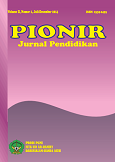ANALISIS PROBLEMATIKA PENGGUNAAN MODEL BLENDED LEARNING PADA MATERI BANGUN RUANG SISWA KELAS 1 SEKOLAH DASAR
DOI:
https://doi.org/10.22373/pjp.v12i1.17700Abstract
The use of blended learning models is very necessary in the implementation of educational activities in the era of the Covid-19 pandemic that has hit Indonesia. This research contains an explanation of the problem analysis that accompanies learning with a blended learning model. The purpose of this study is to explain various kinds of problems and problems that occur when the learning process is carried out with a blended learning model in the material for building rooms for grade 1 elementary school students. The method used in this study is descriptive qualitative with an approach to analyzing the situation of conditions in accordance with the facts in the field as the object of study and the object of research. The results of this study are that there are various probelamtics that accompany learning with a blended learning model such as insufficient student independence, parents who have to accompany their students to study, economic limitations to buy internet credit, unstable signals during online learning, the implementation of strict health protocols during study visits, and the concerns of parents who do not want their children to interact directly with teachers and other students in groups because fear of exposure to the coronavirus considering they are still in the 1st grade of elementary school.
References
Abroto, Maemonah, and Nelsa Putri Ayu. “Pengaruh Metode Blended Learning Dalam Meningkatkan Motivasi Dan Hasil Belajar Siswa Sekolah Dasar.” Edukatif : Jurnal Ilmu Pendidikan 3, no. 5 (2021): 1993–2000. https://edukatif.org/index.php/edukatif/article/view/703.
Alfurqan, Zulvia Trinova, M Tamrin, and Annisaul Khairat. “Membangun Sebuah Pengajaran Filosofi Personal: Konsep Dari Pengembangan Dan Pendidikan Dasar.” Tarbiyah Al-Awlad 10, no. 2 (2020): 213–22.
Anggraini, Yufri. “Analisis Persiapan Guru Dalam Pembelajaran Matematika Di Sekolah Dasar.” Jurnal Basicedu 5, no. 4 (2021): 2415–22.
Anugrahana, Andri. “Hambatan, Solusi Dan Harapan: Pembelajaran Daring Selama Masa Pandemi Covid-19 Oleh Guru Sekolah Dasar.” Scholaria: Jurnal Pendidikan Dan Kebudayaan 10, no. 3 (2020): 282–89. https://doi.org/10.24246/j.js.2020.v10.i3.p282-289.
Bungsu, Titin Kurnia, Mulkah Vilardi, Padillah Akbar, and Martin Bernard. “Pengaruh Kemandirian Belajar Terhadap Hasil Belajar Matematika Di SMKN 1 Cihampelas.” Journal On Education 01, no. 02 (2018): 382–89.
Fadilla, Annisa Nurul, Ayu Suci Relawati, and Nani Ratnaningsih. “Problematika Pembelajaran Daring Di Masa Pandemi Covid-19.” Jurnal Jendela Pendidikan 12, no. 2 (2021): 48–60. https://doi.org/10.47200/aoej.v12i2.447.
Kementerian Pendidikan dan Kebudayaan. “Peraturan Menteri Pendidikan Dan Kebudayaan Republik Indonesia Nomor 37 Tahun 2018.” 2018.
Lase, Delipiter. “Pendidikan Di Era Revolusi Industri 4.0 Education.” Jurnal Sunderman 12, no. 2 (2019): 28–43. 10.1109/ITHET.2016.7760744.
Mahendra, Hatma Heris, and Winarti Dwi Febriani. “Pembelajaran Berbasis Pendidikan Humanistik Pada Mata Pelajaran IPS Di Sekolah Dasar.” Jurnal Tunas Bangsa 6, no. 1 (2019): 7–14.
Rumbewas, Selfia S, Beatus M Laka, and Naftali Meokbun. “Peran Orang Tua Dalam Miningkatkan Motivasi Belajar Peserta Didik Di Sd Negeri Saribi.” Jurnal EduMatSains 2, no. 2 (2018): 201–12. http://ejournal.uki.ac.id/index.php/edumatsains/article/view/607.
Sugiyono. Metode Penelitian Kualitatif. Bandung: Alfabeta, 2021.
Susilowati, Dian Hidayati, Fillah Babul Fathatul Jannah, and Astutri Puji Rahayu. “Pembelajaran Interaktif Melalui Model Blended Learning Di Sekolah Dasar Susilowati1?” Jurnal Basicedu 6, no. 2 (2022): 2747–53.
Tika, I Nyoman, and Siti Maryam. “Pembelajaran Microteaching Selama Massa COVID-19 Berbasiskan Tugas Proyek Bagi Mahasiswa Pendidikan Kimia.” Jurnal Pendidikan Kimia 5, no. 2 (2021): 85–93.
Yin, R.K. Case Study Research Design and Methods Fourt Edition Applied Social Research Methods Volume 5. Vol. 5. United States of America: Sage, 2009.
Zahara, Rosina, Fadhilah Syam Nasution, Yusnadi Yusnadi, and Edi Surya. “Implementasi Pembelajaran Blended Learning Di Jenjang Sekolah Dasar.” Jurnal Basicedu 6, no. 4 (2022): 6482–90. https://doi.org/10.31004/basicedu.v6i4.3189.
Downloads
Published
Issue
Section
License
- Authors retain copyright and grant the journal right of first publication with the work simultaneously licensed under a Creative Commons Attribution License that allows others to share the work with an acknowledgment of the work's authorship and initial publication in this journal.
- Authors are able to enter into separate, additional contractual arrangements for the non-exclusive distribution of the journal's published version of the work (e.g., post it to an institutional repository or publish it in a book), with an acknowledgment of its initial publication in this journal.
- Authors are permitted and encouraged to post their work online (e.g., in institutional repositories or on their website) prior to and during the submission process, as it can lead to productive exchanges, as well as earlier and greater citation of published work (See The Effect of Open Access).

